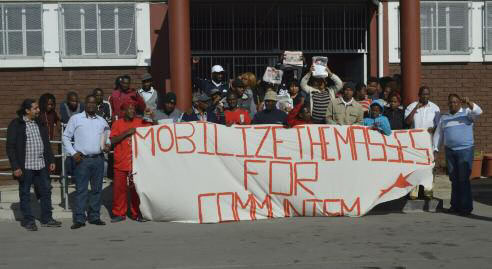
 |
FIGHT FOR COMMUNISM! |
International Communist Workers Party | |
LETTERS, CRITICISM AND SUGGESTIONS
Dialectics and Political Development

I was discussing the article on the “Twists and Turns of Dialectical Development” with my comrade here in South Africa. He explained it to me because to me the actual meaning wasn’t clear. I could read the words, but what it emphasized and what is required of us to do wasn’t clear to me.
But in our discussion it became clear. There was another comrade in my collective in South Africa and we have a rivalry or we don’t see eye to eye. But this article, when we discussed it, just opened my eyes to understand that just because I don’t agree with this comrade or we don’t see eye to eye, it doesn’t mean necessarily that the work of the Party must suffer. So what I actually got from this article is that these contradictions can either come out one of two ways. Either they can destroy a relationship utterly or, on the other end, the relationship could sometimes come out stronger.
So it’s important that we don’t let these differences manifest themselves in a way that will impact negatively on the party. So we must have clear guidelines about not only how to manage them but also how to overcome them. And also we must develop mechanisms that will prevent other comrades from falling into the same trap as we did, or making the same mistakes as we did. So I just wanted to highlight the importance of this piece about dialectics in my development as a comrade, as a leader of the party. It is very important and very insightful and I appreciate it. So keep up the good work, comrades.
--Comrade in South Africa
Obama in Cuba
When US President Barack Obama comes to any third- or second-world country and discusses human rights with them, the entire working class needs to tell him to F* off, pig. That is what Raul Castro should have said to Obama during his “historic” visit. The blood of the oppressed peoples is elbow deep on the sleeve of any US president. The US war against Cuba has never ended. What an insult to attempt to lecture Cuba about human rights. Total BS, the bloody system.
—Fed Up
Not Enough Communism!
The last issue of Red Flag had a thought-provoking letter from “A French Student in Spain”. I disagree with the main point, however, that there is “too much communism” in Red Flag. I don’t think there is enough.
“Student” says that Red Flag articles often make the same points about communism and become repetitious and propagandistic. “Student” has a point but the solution is not to cut back on the communist content.
After all, RF is a communist paper, the only one in the whole world. Where else will workers learn about communism? There must be tens of thousands of articles published in other newspapers every day. None of them (even in ‘left-wing’ papers) have much to say about communism. We should strive to make sure that articles in Red Flag do not downplay or skip communism.
That was the weakness of an article in the same issue – the one on the 62 bazillionaires. What does the article have to say about communism? Not much—just that it’s hard to say how communism will operate but that it’s bound to be better than capitalism.
I agree that articles can be repetitious. Usually, this is because the articles don’t take up communism properly and rely on stock phrases tacked on the end. Phrases like “In communism there will be no money, no banks, no wage, etc.” The list can go on indefinitely. Or substituting a call for communism for actually explaining how communism will end the particular capitalist evil each article talks about.
The solution is laid out in another letter in the same issue, from “East Bay Progressive.” “Progressive” says we should go into more depth about some features of communism, such as living without money. The more we have to say, in depth, about communism, the more useful the articles will be and the less repetitious the paper will seem.
In short, there are no short cuts. The working class must know what they are fighting for to rule society.
—A comrade
The Real Movement that Abolishes the Present State of Things
I found this quote in a book arguing for a society without money.
“...And the moment money goes, you can say good bye to fear, tension, anxiety, overwork and sleepless nights. Why even poverty itself would promptly disappear.”
The book, called Utopia, was written in 1516 - 500 years ago. I like it because it tells us people have struggled against the role of money for hundreds of years.
Anyway, it’s a struggle that developed clarity in both aims and method in the 1800s with the growth of the first communist movement. Marx then reflected the knowledge drawn from that long collective struggle.
“Ideas,” he wrote, “can never lead beyond an old world order but only beyond the ideas of the old world order. Ideas cannot carry out anything at all. In order to carry out ideas, men [and women] are needed who can exert political force.”
“We call communism,” he wrote elsewhere, “the real movement that abolishes the present state of things.” First and foremost, communism is a reaction to capitalism. Every day capitalism assaults us; every day the masses counterattack.
In the last issue, the front page article on the pot luck building for May Day was firmly rooted in how the struggles against the attacks of capitalism can only be fully countered by the struggle for a communist revolution. The article on the Palestinian teachers strike, however, was idealistic. It talked about the hardships facing the teachers and then presented the idea of a communist world, barely related to their struggles.
Whether it is janitors in Los Angeles, USA, and teachers in Palestine fighting wage cuts, or Boeing workers in Seattle and miners in South Africa fighting job cuts, they are right to resist with all their might. They are wrong, however, if they think victories in any of these struggles will better their lives in any significant way.
It is precisely here among workers in struggle that we need the passionate, imaginative power of communists, organizing workers to fight the causes of exploitation - capitalism itself –and building the case for the revolutionary alternative - communism. As that struggle grows, so too will our belief in our own abilities to defeat all the complicated political battles a defeated capitalist class will throw at us.
—Red Reader
Political Strikes for Communism
The recent Palestinian teachers’ strike points to the need for communism. It also suggests something we can do to move toward that goal.
The strike started out over reform issues (pay and class size). The union sided with the government. Teachers denounced the union and told the government to negotiate with the strike coordination committees.
Instead the Palestinian Authority (PA) cracked down on them. Fatah forces attacked strikers as “Hamas proxies” or “Israeli agents” although many were Fatah members or supporters.
Then the original strike for a survival wage became a political strike against the official union and the government. Students and parents joined in massive demonstrations. These revealed widespread frustration with the Israeli occupation and Palestinian Authority corruption.
The strike exposed the dictatorial rule of the PA. It ended with small government concessions toward recognizing the “dignity” that teachers demanded.
Some have mistakenly drawn the lesson that more militant reform struggle is called for. They want to reform the PA or replace Fatah.
Red Flag concluded instead that teachers need to fight for a communist society. But what if teachers had been thinking about this before and during the strike?
Then it would have been realistic to call for a political strike FOR communism, not just AGAINST Israeli apartheid and the PA. Communist teachers and their comrades could have organized others – perhaps many others – around this.
Wherever Red Flag is distributed and read massively, we should take seriously the idea of political strikes for communism.
Strikes can’t win communism. That will take armed insurrection and revolution. But they create opportunities to put workers in motion around communist ideas: to MOBILIZE MASSES FOR COMMUNISM.
—Red Teacher
